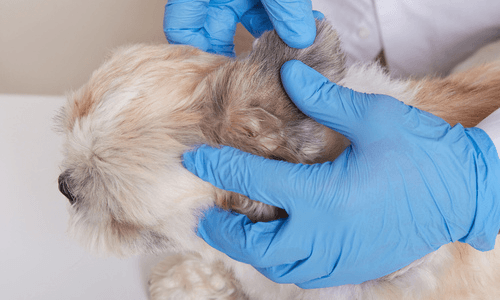Distemper, Parvo and Ticks: Info for Flagstaff Pet Parents
Top tips for keeping your pets safe from parvo, distemper, fleas and ticks in Flagstaff, AZ.

As a passionate pet parent in Flagstaff, Arizona, you know how important it is to keep your furry friends safe and healthy.
With the beautiful outdoors of Arizona comes the responsibility of protecting our pets from potential health threats like distemper, parvo, and ticks.
This article will arm you with the knowledge you need to recognize and prevent these conditions, ensuring your pets are as happy and healthy as possible.
Understanding Distemper
Distemper is a serious viral disease that affects dogs, and sometimes ferrets and other animals. The virus attacks the respiratory, gastrointestinal, and nervous systems. Understanding what causes distemper and its symptoms can help you take prompt action.
What Causes Distemper?
Distemper is caused by the canine distemper virus (CDV), which is highly contagious. It spreads through airborne exposure (from sneezing or coughing) or by sharing food and water bowls with an infected animal. Puppies and unvaccinated dogs are at higher risk of contracting this disease.
Recognizing Distemper Symptoms
Early symptoms of distemper can resemble a cold or the flu, including fever, nasal discharge, coughing, and lethargy. As the disease progresses, symptoms can worsen to include vomiting, diarrhea, seizures, and even paralysis. If your pet shows any signs of distemper, it's crucial to contact your veterinarian immediately.
The Dangers of Parvo
Parvo, short for canine parvovirus, is another severe and highly contagious viral disease affecting dogs. It primarily impacts the gastrointestinal tract and can be fatal without prompt treatment.
Parvo Causes and Transmission
Parvo is caused by the canine parvovirus, which is transmitted through direct contact with an infected dog or indirect contact with a contaminated object, like food bowls, leashes, or even the environment. Puppies, especially those between 6 weeks and 6 months old, are most susceptible to parvo.
Identifying Parvo Symptoms
Common symptoms of parvo include severe, bloody diarrhea, vomiting, loss of appetite, and extreme lethargy. These symptoms can lead to rapid dehydration, making it essential to seek veterinary care immediately if you suspect your dog has parvo.
Tackling Ticks in Arizona
Arizona's warm climate creates an ideal environment for ticks, which can pose significant health risks to dogs. Understanding when tick season occurs and how to protect your pet can help prevent tick-borne diseases.
Arizona Tick Season
Ticks are most active in Arizona from March through October. During this time, they thrive in the warm and dry environment, waiting for unsuspecting hosts. Regularly checking your dog for ticks during these months is crucial.
Preventing Tick-Borne Diseases
Ticks can transmit diseases like Lyme disease, Rocky Mountain spotted fever, and tick paralysis. To protect your pet, use veterinarian-recommended tick prevention products, keep your yard tidy, and inspect your pet for ticks after outdoor activities. If you find a tick, remove it promptly and carefully to reduce the risk of disease transmission.
Keeping Your Pet Safe
As a Flagstaff pet owner, it's vital to take proactive steps to protect your pet from distemper, parvo, and ticks. Here are some actionable tips to keep your furry friend healthy:
Regular Vaccinations
Vaccinations are the first line of defense against distemper and parvo. Ensure your pet receives all recommended vaccines and boosters. Puppies should start their vaccine schedule at 6 to 8 weeks old, continuing with boosters until they are 16 weeks old.
Maintain a Clean Environment
Keeping your pet's environment clean helps reduce the risk of infection. Regularly wash bedding, clean food and water dishes, and disinfect surfaces your pet frequently contacts.
Routine Vet Visits
Schedule regular veterinary check-ups to monitor your pet's health and catch any potential issues early. Your vet can provide valuable advice on vaccination schedules, tick prevention, and other health concerns specific to the Flagstaff area.
Choose the Right Pet Care Facility
When choosing a pet resort or daycare, ensure the facility meets high standards of care. Look for features like temperature control, stress-reducing measures, and a staff certified in CPR and medication administration. This will give you peace of mind knowing your pet is in good hands while you're away.
Conclusion
Being a responsible pet parent in Flagstaff means staying informed about potential health threats like distemper, parvo, and ticks.
By understanding the causes and symptoms of these conditions, keeping up with vaccinations, and choosing a reliable pet care facility, you can ensure your furry friend stays healthy and happy.
Remember, your pet relies on you for their well-being, and with the right knowledge and resources, you can provide them with the best care possible.
Articles You May Like











